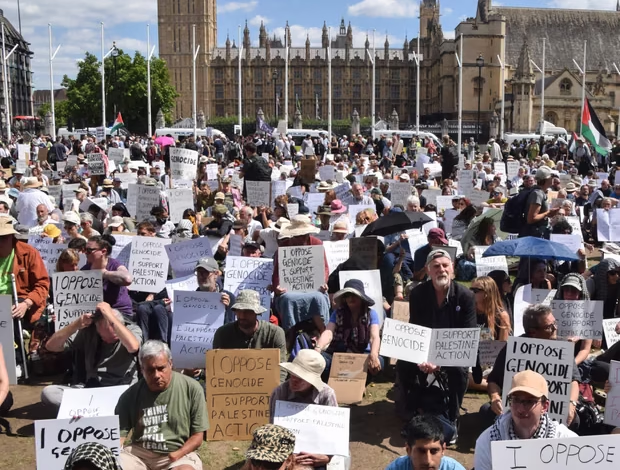We voted for and against the ban on Palestine Action. Now we have a plan to end this mess

By Stella Creasy and Peter Hain – The Guardian:
Neither of us support the organisation, but what is happening fails to either protect protest or make it policeable. There is another way
Is terrorism really a vicar with a peaceful placard?
As parliamentarians who are passionate about democracy and civil liberties, we know that both are under threat. A growing number of organisations encourage violence and intimidation in pursuit of political aims. MPs are besieged with threats, advised not to hold in-person surgeries and are grieving still for two colleagues killed in the past 10 years. Anti-migrant protests and threats are encouraged by the far right to take place across the country. Yet attempts to address all this are increasingly destabilising public confidence in politics, emboldening those who fan the flames of hatred by claiming a “two-tier” response. Without change, the danger that someone will get hurt – or killed again – will only grow.
Driven by both homegrown and overseas extremism, and social media algorithms, there is a growing trend for direct action to end in physical harm or destruction in order to get noticed. Proscription is the primary tool open to governments to put a hard stop to this, but with nearly 100 organisations and hundreds more Britons now labelled “terrorists” in recent weeks, it is becoming increasingly difficult to maintain parity between the organisations proscribed within the public mind. For any law to be effective, it has to be workable and legitimate. For it to defend democracy, it must also not be designed – or be seen to be designed – to spare ministers the difficulties of dealing with dissent. Proscription puts the person peacefully expressing opposition into the same category as the person planting a bomb or shooting a bullet.
We came down on different sides in last month’s vote on whether to proscribe Palestine Action, and neither of us have ever supported the group. But we both agree what is happening now neither protects protest nor makes protest policeable.
We have three shared convictions. First, no one – including elected politicians and the police – should face violent threats or intimidation for doing the job that we ask of them, even if we disagree with how they do it. Second, everyone should be able to protest and engage in non-violent disruption without being lumped in with Islamic State, al-Qaida or the IRA. Third, legislation to uphold our civil rights and to stop intimidation should be cause-blind: protecting those whom we wish to beat at the ballot box by enabling all citizens to be heard and parliamentarians to do our jobs.
How, then, should the government respond? First and foremost with common sense. Urgent police guidance should be issued to head off the car crash that proscription enforcement is rapidly becoming, by setting out a test of proportionality for any interventions. Proscribing the original Palestine Action group was said to be about stopping those inciting direct harm and violence. Going after people with a poster testing the boundaries of liberty – some who may or may not even support Palestine Action but feel strongly about Palestinian rights – confuses rather than clarifies the government’s intention. People must be able to protest about the horror in Gaza, and the focus should be on what is happening in Palestine, not in Parliament Square.
The government should be much more transparent about how it is upholding our constitutional rights. There is no free speech if one half of a political debate lives in fear of being targeted for disagreeing. We need mechanisms to stop those who use violence, threaten migrants or hound women instead of raising their voices to achieve their goals. Lord David Anderson, the former independent reviewer of terrorism legislation, argued that proscription should always be a time-limited process – and we agree. It should also be targeted at real terrorists whose explicit intention is to kill innocent civilians.
No democratic state should make arbitrary decisions and must actively seek the consent of citizens. As it stands, how proscription is achieved – short parliamentary debates in both houses and, in the case of Palestine Action, bracketing the organisation along with two far-right groups in a single vote – fails this test. To have the ability to proscribe a group as “terrorists”, ministers and government must do much more to show the public how and why that is the case.
We must also address the glaring inconsistencies and real gaps in law these cases reveal. Legislation on public order focuses on specific practices; proscription orders target specific terrorist groups. Nothing sits between this to recognise when organisations themselves encourage members repeatedly and deliberately to escalate intimidation in pursuit of their aim. Extreme groups create a climate of violence, leaving refugees waiting to be firebombed, Jewish citizens attacked, black and Muslim citizens living in fear, and women increasingly vilified.
Getting the balance right means abolishing offences such as “recklessly encouraging support” of a proscribed group and focusing instead on those who organise this criminality. Setting out how and when behaviour threatens our democracy – as distinct from criticising state policies – would also better maintain the integrity of the seriousness of terrorism charges. Stopping organisations that are not simply accidentally violent, but intentionally so, means a new offence is needed, distinct from the battery of existing criminal ones. This would recognise how groups that encourage violence and intimidation go beyond existing public order offences, disentangling non-violent direct action from violence or attacks on property and terrorism.
The alternative – accepting that harm to individuals is an inevitable risk of protest because people feel strongly about something – is not tenable. Terrorism is different from terrifying opponents, but both are or should be criminal offences. The failure to make that distinction is both increasingly infecting the policing of protest and undermining the legitimate right to protest.
Anyone who thinks this situation is simple – either an egregiously authoritarian power-grab from the government or a sincere intention to block violent thuggery – isn’t paying attention. The status quo has come to mean equating peaceful witness with terrorism, and isn’t sustainable. But neither is pretending there isn’t a problem that threatens our ability to debate, disagree and ultimately decide in our democracy. Without action, it will be those with the loudest voices and the most lethal actors who win.





